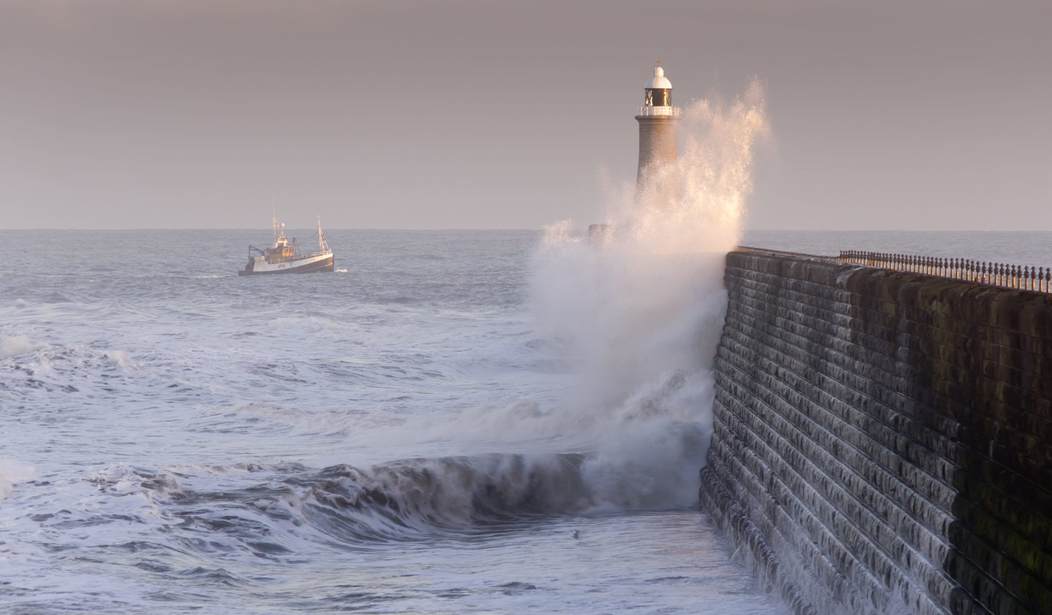On Monday, Politico engaged in some top-notch investigative journalism to discover … that Donald Trump is a prudent businessman. Scratch that — I mean he’s a global warming hypocrite. Despite opposing the idea that human action like the burning of fossil fuels significantly causes climate alterations, Trump applied for a permit to build a sea wall around his golf course in Ireland, citing rising sea levels and the possibility of worsening erosion in coming years.
Politico‘s Ben Shreckinger seemed convinced that this action proves that Trump is a closet believer in climate change. He even went so far as to suggest The Donald will alter his position on the issue during a later phase of the presidential election.
Nevertheless, it is entirely consistent for a businessman and landowner to take actions to defend his land holdings from natural threats, whether he believes those natural threats to be man-made or not. As any good Boy Scout knows, one should always “be prepared.”
“The Politico story is a case study in media bias and confusion about the issue of climate change,” Jay Richards, assistant research professor at the Catholic University of America and senior fellow at the Discovery Institute, told PJ Media in an email statement. “There’s no contradiction or hypocrisy in Trump’s actions here.”
H. Sterling Burnett, research fellow on the environment at the Heartland Institute, agreed. “He’s a businessman and he doesn’t want his properties destroyed — it’s called prudent business planning.” Burnett further emphasized that businessmen “should be looking ahead regardless of what you think the source of sea level rise is.”
Here are PJ Media’s 4 big problems with Politico‘s take on the issue.
Next Page: Trump himself did not cite global warming.
4. Donald Trump did not cite man-made climate change in his application to build a sea wall.

Republican presidential candidate Donald Trump speaks during the Palm Beach County GOP Lincoln Day Dinner at the Mar-A-Lago Club, Sunday, March 20, 2016, in Palm Beach, Fla. (AP Photo/Wilfredo Lee)
Shreckinger reported that The Donald is “trying to build a sea wall designed to protect one of his golf courses from ‘global warming and its effects,'” as if this clinches the issue. The big problem is, Trump didn’t write those words — his company did. Furthermore, he has ample reason to want to defend his golf course from erosion.
Trump bought the golf resort (known as the Trump Doonbeg) in May 2014, and he vowed to invest up to €45m in the property, promising to “reshape it and make it one of the greatest golf courses in the world.”
Days later, however, “a single storm eroded as much as eight meters of frontage in some parts of the golf course,” Shreckinger reported. Wait — if a storm damaged the property just days after Trump purchased it, isn’t it perfectly natural for him to want to defend it against further damage? Indeed, Shreckinger notes that “since acquiring the property, Trump has been trying to build coastal protection works to prevent further erosion.”
Next Page: Using climate alarmism as a tool, not a belief system.
3. The company’s sea wall application does not say climate change is real, it only urges caution due to alarmist projections.
When the Trump International Golf Links applied for the permit to build a sea wall, the company did in fact cite alarmist projections about climate change. But these were framed as a hypothetical scenario, something to prepare against, not something to believe in.
As Shreckinger reports (emphasis added):
The [Trump International Golf Links] statement acknowledges one Irish government study that assumes a steady rate of erosion through 2050, but argues that the study fails to account for the effects of climate change: “If the predictions of an increase in sea level rise as a result of global warming prove correct, however, it is likely that there will be a corresponding increase in coastal erosion rates not just in Doughmore Bay but around much of the coastline of Ireland. In our view, it could reasonably be expected that the rate of sea level rise might become twice of that presently occurring. … As a result, we would expect the rate of dune recession to increase.”
The bigger problem, though, according to the impact statement, will be the erosion caused by larger, more frequent storms. “As with other predictions of global warming and its effects, there is no universal consensus regarding changes in these events,” it states. “Our advice is to assume that the recent average rate of dune recession will not alter greatly in the next few decades, perhaps as far into the future as 2050 as assumed in the [government study] but that subsequently an increase in this rate is more likely than not.”
So the Trump International Golf Links, not The Donald himself, suggests that the property be defended just in case. In fact, the very statement openly declares that “there is no universal consensus regarding changes in these events”! This doesn’t sound like climate alarmism to me, only a prudent emphasis on being prepared, just in case climate alarmists end up being right.
Also, Trump is allegedly the kind of businessman who will overemphasize things he himself considers false, so long as they serve his own ends. This is how the real estate business works in New York City, his defenders say, and that very well might be true. If so, this is a case of Trump’s company using climate alarmism as a tool to build protections around its property. Very canny.
Next Page: Erosion is nothing new…
2. Erosion is not a new phenomenon, caused by greenhouse gases.
“There has been erosion for as long as there has been a planet Earth, with or without human-induced climate change,” Jay Richards, the Catholic University professor, pointed out. Landowners and homeowners have been protecting their property from the devastating effects of erosion as far back as human records go.
Indeed, the very flooding of the Nile in ancient Egypt which allowed lush agriculture there also destroyed homes and even cities. Erosion is a natural threat to land, with or without human interaction.
Burnett, the Heartland scholar, argued that sensitivity to erosion might explain The Donald’s desire to build a sea wall in Ireland. If the golf course “is particularly vulnerable to erosion, he’s planning ahead,” Burnett explained. “My suspicion is that his properties over there have erosion, subsidence, and sea level rise — of which some very small portion might be due to human impact on the environment.”
Next Page: What about rising sea levels? Isn’t that evidence of climate change?
1. Sea level rise is mostly natural, and only a small portion can be linked to human causes.
Trump’s application for a sea wall cites rising sea levels — a key point among climate alarmists. So isn’t this conclusive proof that The Donald accepts global warming? Not so fast.
Trump “could very well believe that the globe is warming and sea levels are rising, without thinking humans are the primary cause of it,” Jay Richards argued. There is a great deal of evidence to support this hypothesis.
“In fact, sea levels have been rising naturally since the end of the last ice age and will continue rising until the next ice age comes,” the environment scholar Burnett told PJ Media. Perhaps ironically, he added that “right now, they’re rising at a rate which is slower than much of the last ten thousand years.”
Contrary to what climate alarmists might expect, sea levels “are not rising any faster now than they were rising fifty years ago.” If the burning of fossil fuels is causing rising sea levels, it’s sure taking its sweet time.
Even estimates from the Environmental Protection Agency (EPA) admit that, if the United States achieves its green energy goals, it would only slow sea level rise by a fraction of an inch. “It wasn’t an inch, it wasn’t two inches, it was a percentage of an inch!” Burnett argued, “I’d want to ask about the other inches — the 7 to 12 inches. That isn’t coming from U.S. greenhouse emissions.” Flippantly, he added, “maybe it’s all on China.”
Burnett also noted that Trump has many properties near sea level, but he is only trying to build a sea wall in Ireland. “I know he’s got some stuff down in Florida, is he building sea walls there? If he thinks this is a global phenomenon, and he has a lot of beachfront properties, why isn’t he doing it everywhere?”
The fact that Trump is only focused on Ireland suggests that the threat to that particular golf course is unique. Indeed, Burnett added that “if our emissions drop by the amount the EPA plans with Obama’s climate goals, he’d still need the sea wall, I’d expect.”
Noting that global warming’s contribution — if anything — is small, the scholar once again mocked the Politico article’s claim about Trump’s hypocrisy. “If he took out flood insurance for properties in a flood zone, does that mean he’s believing in climate change?” Only a Politico reporter could connect those dots.












Join the conversation as a VIP Member